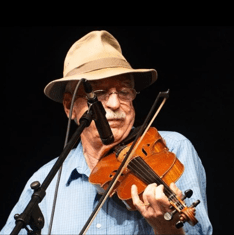
Cover Photo: Gerry Milnes performing.
D&E Student Blog: This blog post was written by a D&E student, Alyssa Stump, in the ENGL 326: Writing for the Community course as a collaboration with Augusta.
Gerry Milnes, a long-term Elkins resident, is a multi-instrumentalist, folklorist, and writer, and he spent decades collecting tunes and tales from Appalachian musicians. He not only focuses on the music but also where it comes from and the values and stories that go along with it. I asked him when he started playing music and he said, “I was always interested in old people and traditional things. Once I started meeting old-time fiddle players, I knew that’s what I wanted to do.”
Traditional music differs from some modern music in the way that most players don’t rely on sheet music. Instead, the piece is passed down to them from people who got it from someone else, which is a big part of the tradition of passing down music. An example Milnes gave is “The Battle of Droop Mountain,” a tune which he heard on his final visit to a 90-year-old fiddler. “He hadn’t remembered the tune in 50 years, but that day, he played it. I recorded it. That tune, its story, its history was saved.”
Milnes explained to me the history behind that song. On November 6, 1863 in Pocahontas County, “There was a major civil war battle that happened in West Virginia and here was a tune that commemorated that event. The old man I’m talking about, he had a grandfather on each side of that battle, so that’s how bad things in that civil war was here. A grandfather on each side fighting each other and neither one was killed, one had a grazed shot and one had a horse shot from under him. So he told me this story and played the tune. And I’m thinking ‘boy, I’m glad I visited him!’ you know that last time before he died and he remembered the tune. The sad thing is that some tunes do disappear because nobody learned them. And there’s lots of people like myself who are trying to prevent that from happening.”
So, what are some ways we can prevent these stories from disappearing? From a modern lens we have seemingly unlimited access to the world around us, and sharing music is a way for people’s stories as well as the tunes to get out to others and be remembered. By being passed down, it’s subject to change how people play either in a regional or personal style. Therefore, each person will always play something slightly different than the original, just as Milnes plays a tune differently than the person he learned it from, and his son plays it differently than him. However, it’s beneficial for players to record and use as a reference when learning the tune, as it’s very hard to get it on the first try after hearing it only once.
I also asked him if there was still some value to writing traditional music down; in which he replied: “Traditional music doesn’t have anything to do with the eyes; most fiddle players don’t read music. It has everything to do with your ears because you hear it and learn it, you play it and you don’t see it at all. In my view it’s good because music keeps evolving, it’s not set on a printed page which could be beneficial from a historic perspective because you want to know what the music sounded like 200 years ago. There are plenty of books that people have written fiddle tunes in. Fiddle players don’t read them and learn them fiddle players learn them from someone else.”
In Elkins, West Virginia, music is still thriving. “The last time I counted,” he says, “there were about 21 fiddle players in Elkins alone.” The Augusta Heritage Center, where Milnes worked for 25 years, remains a place where people can go to learn more about Elkins as well as to help preserve stories and ideas such as this. Each summer, it draws musicians from around the world for workshops in different genres of music such as Old-Time, Bluegrass, Cajun, Blues, and Classic Country. Importantly, children are getting involved too! Through the Augusta Heritage Center, kids can learn instruments and receive instructional assistance. “We’ve got seven- and eight-year-olds learning to play this music,” Milnes continues, “That makes me really happy. It means there’s a future for this type of music.”
Milnes has been preserving these stories as well as passing on the tradition to others. “I write about music,” he says, “but also about traditional arts of all kinds. It’s never been my full-time job. But it’s always been a big part of my life.” And for those who listen to traditional music it’s never just about how it sounds or makes them feel but the story behind it that matters the most.
D&E Student Bio: Alyssa Stump is a native of West Virginia who is studying Communication and English (Writing) at Davis & Elkins College. She plans to travel to South Korea next year to study abroad and learn more about translation.
